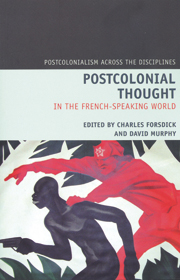Book contents
- Frontmatter
- Contents
- Acknowledgements
- Introduction: Situating Francophone Postcolonial Thought
- Section 1 Twelve Key Thinkers
- Section 2 Themes, Approaches, Theories
- 13 Postcolonial Anthropology in the French-speaking World
- 14 French Theory and the Exotic
- 15 The End of the Ancien Régime French Empire
- 16 The End of the Republican Empire (1918–62)
- 17 Postcolonialism and Deconstruction: The Francophone Connection
- 18 Negritude, Présence Africaine, Race
- 19 Francophone Island Cultures: Comparing Discourses of Identity in ‘Is-land’ Literatures
- 20 Locating Quebec on the Postcolonial Map
- 21 Diversity and Difference in Postcolonial France
- 22 Colonialism, Postcolonialism and the Cultures of Commemoration
- 23 Gender and Empire in the World of Film
- 24 From Colonial to Postcolonial: Reflections on the Colonial Debate in France
- Notes on Contributors
- Bibliography
- Index
21 - Diversity and Difference in Postcolonial France
from Section 2 - Themes, Approaches, Theories
- Frontmatter
- Contents
- Acknowledgements
- Introduction: Situating Francophone Postcolonial Thought
- Section 1 Twelve Key Thinkers
- Section 2 Themes, Approaches, Theories
- 13 Postcolonial Anthropology in the French-speaking World
- 14 French Theory and the Exotic
- 15 The End of the Ancien Régime French Empire
- 16 The End of the Republican Empire (1918–62)
- 17 Postcolonialism and Deconstruction: The Francophone Connection
- 18 Negritude, Présence Africaine, Race
- 19 Francophone Island Cultures: Comparing Discourses of Identity in ‘Is-land’ Literatures
- 20 Locating Quebec on the Postcolonial Map
- 21 Diversity and Difference in Postcolonial France
- 22 Colonialism, Postcolonialism and the Cultures of Commemoration
- 23 Gender and Empire in the World of Film
- 24 From Colonial to Postcolonial: Reflections on the Colonial Debate in France
- Notes on Contributors
- Bibliography
- Index
Summary
Questions of immigration, diversity and race have dominated the social, cultural and political life of France since the late twentieth century. Even before the widespread uprisings in the banlieues (France's deprived suburbs) in the autumn of 2005, the question of how the French might conceive of themselves as a nation that could (or could not) embrace peoples of different origins and traditions fuelled seemingly endless debates among intellectuals, politicians and people of all walks of life. The riots themselves focused attention as never before upon the fact that large numbers of French citizens not only resented police harassment and lack of job opportunities but also felt fundamentally alienated from traditional ideas of what it meant to be French. At the same time, increasing questions about France's colonial past – about the Algerian War, or the history of Caribbean slavery – have forced reappraisals of the nation's treatment of peoples of colour in its empire. For few other countries in the contemporary world has the question of postcolonialism and national identity been so agonizing.
At the heart of debates about postcolonialism in France lies the contrast many have drawn between republican universalism and multiculturalism. Frequently (and at least in part erroneously) conceptualized as French universalism versus Anglo-Saxon multiculturalism, this dichotomy posits the following opposition. On the one hand, some argue that all citizens of the Republic should be treated as individuals only, without regard to or even knowledge of community traditions or differences based upon race, religion, gender, or other factors (Finkielkraut, 1987).
- Type
- Chapter
- Information
- Postcolonial Thought in the French Speaking World , pp. 259 - 270Publisher: Liverpool University PressPrint publication year: 2009



